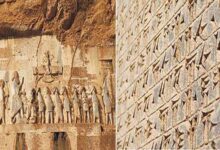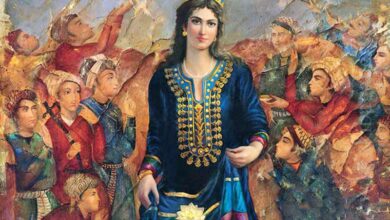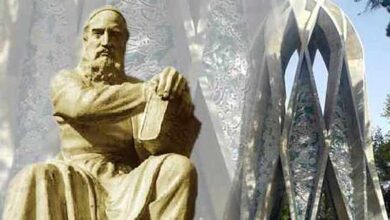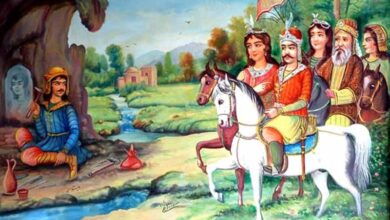Love in Literature
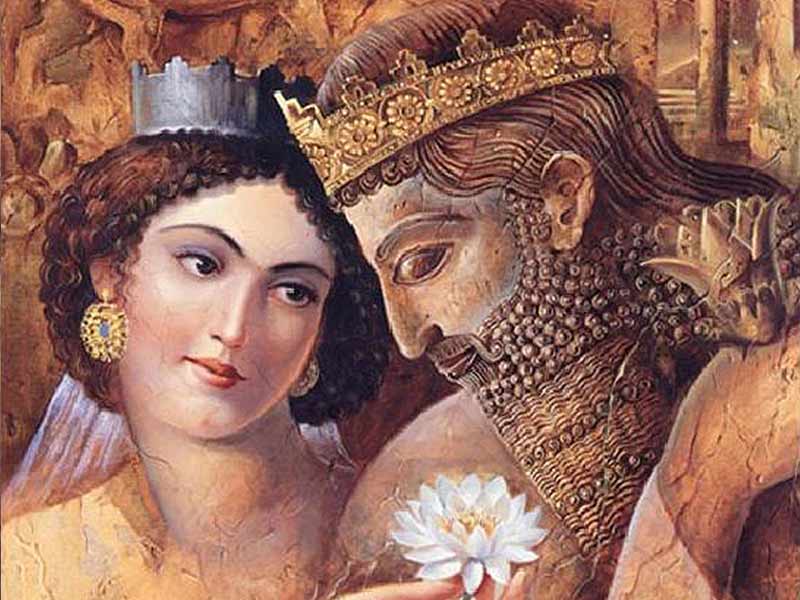
The word “love”, which is pronounced “Eshgh” in Persian, has a prominent place in Persian literature and Iranian mysticism. Perhaps it can be said that various Persian-speaking poets have used fewer words as much as love.
However, it seems that so far little research has been done on the basis of recent achievements in historical linguistics. In this short essay, the author suggests that the word love has Indo-European roots. This proposal is based on etymological research. Datar hopes that this article will be an incentive for further research on this word and other lesser known Persian words. So that Iranians know the Persian language better and realize its high values and capabilities.
Morphophonemics
Love can be related to the Avestan word -iš meaning “to desire, to desire, to desire, to seek.” Which has the following synonyms: -aēša “wish, desire, search”; išaiti “wants, desires”; -išta “wanted, beloved”; -išti “wish, purpose”. He also suggests that the word love is derived from the Avestan word -iška * or something similar. The suffix ka- will be displayed at the bottom. The Avestan word -iš is synonymous with the Sanskrit -eṣ “to wish, to desire, to seek”; -icchā “wish, desire, desire”; icchati “wants, wishes”; -iṣta “wanted, beloved”; -iṣti “wanted, searched”; Pali icchaka’s word “wanting, wanting.” Also, according to the late Farhoushi, this word in Middle Persian is left to the device (= form ِ) išt “desire, desire, wealth, desire, property”. For more information on the word “form”, refer to the “Etymological Culture of Astronomy and Astrophysics”. The Avestan and Sanskrit words come from the first Indo-European root -ais * “to desire, to desire, to seek”, whose nominal root is -aisskā * meaning “desire, desire, search”. Outside of Avestan and Sanskrit, several other languages have retained branches of that original Indo-European word: Old Church Slavonic isko, išto “seek, desire”; iska “wish”; Russian ‘iskat“ search, seek ”; Lithuanian ieškau “search”; Latvian iēskot “lice search”; Armenian ‘aic“ inspection, test ”; Latin aeruscare “to beg, to beg”; Old German top eiscon “to wish, to wish”; Old English ascian “asking”; English ask.
But about the traditional roots of love. Lexicographers have linked the word love to the Arabic word ašaq, meaning “to cling to” (ahrab), “to stick to something” (Aghrab o-lmavared). The author of Ghias al-Laghat tries to make a connection between attachment, attachment and love: It dries up. This is the state of love, it dries up its owner in every heart that dries up. ”
Because Arabic and Hebrew belong to the Semitic language family, the original Semitic words are usually derived from both Arabic and Hebrew with similar meanings. And it is interesting that “love” has no Hebrew counterpart. The word used for love in Hebrew is ahav, which is related to the Arabic habba. Another Hebrew word for love is “Khashagh” (xašaq) meaning “wanting, wishing, attaching, attaching; Pleasure ”, which is used many times in the Old Testament Torah. According to Professor Scott Nogel, the Hebrew word xašaq and the Arabic word ašaq are not synonymous. The Hebrew vowel “Kh” equals the Arabic “H” or “Kh” and the Hebrew “Ei” equals the Arabic “Ei” or “Gh”, but they do not mix. Also, usually the Hebrew “Sh” tends to the Arabic “S” and vice versa. On the other hand, the semantic similarity of these two words in Arabic and Hebrew is coincidental, because their original root meanings were not the same. The Hebrew dryness probably originally meant “to close” or “squeeze,” as the equivalent of gently indicates. Also, Professor Werner Arnold emphasizes that the Hebrew “خ” at the beginning of a word always turns into “H” in Arabic and never becomes “Ei”.
Another interesting point is that “love” does not appear in the Qur’an. The word used is the same as the source of habba, which was mentioned with its detachments, for example, the nominal plural of hubb. It is also known that in modern Arabic the word love is not used much and most of the habba and its detached plots are used: Love, Habib, Habiba, Mahboob, and others.
Take a look at Ferdowsi
As we know, Ferdowsi refuses to use Arabic words diligently to protect the Persian language. However, he uses the word love easily. Although poetic freedom allows him to substitute another word for love. One may ask, why does Ferdowsi not use the word love, which is the main and common word of love in Arabic, and is like a syllable like love, and therefore does not upset the weight of the poem? Because the lord of the Shahnameh, although he did not have our current knowledge of the language and etymology of Indo-European words, probably knew that love is Persian words.
Laugh and say that I say oh witty eyes of your love, not of pain and anger
The seedlings should not be overwhelmed by the love of Zal
It appears then, thin and yellow, behind someone who is sad with love
Zal’s heart suddenly went crazy, wisdom turned away, wise love became
It is interesting to know how Ferdowsi himself wrote the word love. Probably without “AS”, by “Ishq” or even “Ashk”! But this point is not easy to understand, because the oldest surviving manuscript of Shahnameh dates back to about two centuries after Ferdowsi. To be more precise, it is a version that was transcribed on the 30th of Muharram 614 AH (equivalent to Monday, May 15, 596 of the Iranian solar calendar and May 15, 1217 AD).
We suggest the following procedure for the word love to exist: Indo-European First -ais * “to desire, desire, seek”, -aisska * “desire, desire, search”> Avestan -iš “to desire, to desire,” Search ”and> -iška *“ desire, desire, desire ”. The suffix ka- is widely used in Avestan and is found, for example, in the following words: -mahrka “death”; -araska “jealousy, envy”; -aδka “clothes, robes, robes”; -huška “dry”, -pasuka “four-legged, star” (next to pasu and pah “four-legged, herd, flock”; in Tati Keringani dialect “pas” = “sheep”; in official Persian “shepherd” and “shepherd” from pasu.pan *); -drafška “درفش”; -dahaka “biting (?), laughing (with -aži); And others. The Avestan word probably formed the word išk * in Middle Persian, which found its way into Arabic.
Two possibilities can be imagined about how this word translates to Arabic. The first is that išk * entered Arabic during the Sassanid period, when the Iranians dominated the Arab world (especially Hira, Bahrain, Oman, Yemen, and even the Hejaz). For more information on how Persian influenced Arabic in pre-Islamic times, refer to Azartash Azarnoush’s book “Ways of Persian Influence in Tazi Culture and Language”, published by the University of Tehran, 1975. The Persian transliteration of “K” in Arabic “Q” is not rare, a few examples: Kandak> Khandagh, Zandik> Zandiq, Kafiz> Qafiz, Kushk> Josq, Kase> Qaseh (written by Al-Ma’rab Jawaliqi, Mintah Al-Arab, Aqarbalmoord It is interesting that in this last word (story) not only “k” is translated as “q”, but also the two vowels “s” and “as”, which are specific to the Semitic languages, have emerged. We see another example of the tradition of “AS” in the name of the island and the city of Abadan, which is called Ibadan in Arabic.
It must be said that the ancient Abyssinian dynasty, according to Ptolemy (Ptolemaeus), the famous astronomer and geographer of the second century AD Apphana or, according to Marcian, the fourth century AD geographer, is Apphadana. Here, too, the first vowel has been changed to the Arabic “AS”.
According to the research of the late Farahvshi, the main design of the name of this island is taken from the ancient Persian ā -ppā, from āp meaning “water” and -pā meaning “to watch, to guard”; Overall, it means “water station (shore) of the water” (coastal checkpoint of the Persian Gulf). And the last example of this is “qarqummama” or “qarqummna”, “the pain of” saffron oil “, which is a device of the Arabic word krokomagma, from krokos” saffron “and magma” pain “. Oil”. It was used in Greek medicine (Galen).
In short, there are a few examples of the substitution of the vowels “غ” and “ط” in words borrowed from Arabic from foreign languages, when these sounds do not exist in the original language. From Greek: Pythagoras; قاطیغوریا (category); Organon; Magnetism (magnesia-lithos); Astrolabos; Thales; Aristotle, Aristotle. From Persian: طاس (tašt); طسّوج (tasoj); طسق (tašk); طَبَق (tabgh). From French in modern Arabic: gaz (gaz), which in Persian is gaz, a state of matter (solid, liquid, gas)
And finally the navigation of the word išk * in Arabic. It is also possible that the word was introduced into Arabic at the beginning of the Islamic era. Since lexicographers and scribes were unaware of the Iranian origin of the word, which includes the meaning of “wanting, seeking,” they confused it with the Arabic of love, which is “to cling.”
* Sources and references are available in the editorial office of Artmag.



